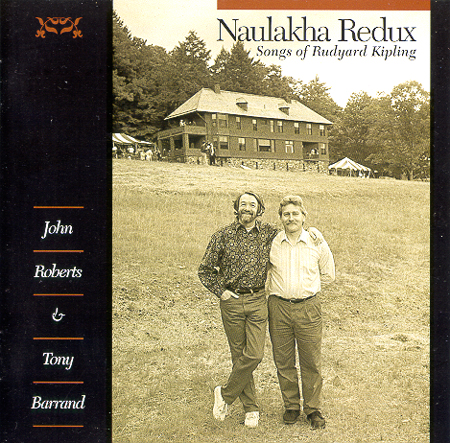 | ||||||||||||||||||||||||||||||||||||||||||||||||||||||||||||||||||||||
|
GHM-104 Naulakha Redux
Playlist |
Technical Info |
CD Notes |
Song Notes |
Order
| ||||||||||||||||||||||||||||||||||||||||||||||||||||||||||||||||||||||

|
||||||||||||||||||||||||||||||||||||||||||||||||||||||||||||||||||||||
| ||||||||||||||||||||||||||||||||||||||||||||||||||||||||||||||||||||||
| Lyrics for each song can be accessed by following the links in the playlist above. | ||||||||||||||||||||||||||||||||||||||||||||||||||||||||||||||||||||||
| TECHNICAL INFORMATION | ||||||||||||||||||||||||||||||||||||||||||||||||||||||||||||||||||||||
|
Tony Barrand: vocals, jaw's harp Recorded at Soundesign, Brattleboro, VT |
||||||||||||||||||||||||||||||||||||||||||||||||||||||||||||||||||||||
| CD NOTES | ||||||||||||||||||||||||||||||||||||||||||||||||||||||||||||||||||||||
|
In the summer of 1994, John Roberts and I were commissioned to put together a series of concerts for the re-opening of Kipling's house, Naulakha, in Dummerston, Vermont, just over the town line from my home in Brattleboro. The Landmark Trust, a charity founded in 1965 "give life to historically significant buildings," was making its first foray into the U.S.A. at the suggestion of an American fan of Kipling's, David Tansey. He had discovered that the house, built in 1892 had been unoccupied since 1942. The Kiplings had returned abruptly to England in 1896 after a much-publicized family dispute and it was only used as a summer home for nearly 40 years after that. Since June of 1995, Naulakha has been available for weekend and weekly rentals. "Naulakha" means, "Jewel Beyond Price" in Hindi and the house was Kipling's pride and joy. He married Caroline Balestier, the sister of his friend, Wolcott Balestier, with whom he had written a novel of the same name. While in the house, he wrote The Jungle Books, Captains Courageous, A Day's Work, and The Seven Seas. He also began Kim and the Just So Stories. Most of the songs we were privileged to sing at the official re-opening, however came from other books. We were thrilled to accept the challenge of presenting Kipling the songwriter. John and I had grown up with his work cast regularly in musical settings on B.B.C. radio. Our good and, now, late friend, Peter Bellamy, had set about fitting traditional tunes and making up others to go with the pieces from the Barrack Room Ballads, the Puck stories in Puck of Pook's Hill and Rewards and Fairies, and other verse. We had recorded two of these, "A Tree Song" and "A Smuggler's Song," in the 1970's. This recording is as much a memorial to our friend, Peter, as it is an homage to Kipling's verse. Singing from the old tennis court at Naulakha that weekend in June of 1994, looking up at the house, the spirits of both men were paying close attention. I have a treasured copy of a 1914 edition of Songs from Books in which Kipling had brought together almost all of the verses scattered throughout his prose writings and, as my knowledge of English folk music increased, noticed how often rhythms and turns of phrase had been "borrowed" from the traditional songs. He would have known the folk songs from his time as a journalist in India and his days when the world and pubs of the London music halls was literally across the street. A verse from "When 'Omer Smote 'Is Bloomin' Lyre" sprang out When 'Omer smote 'is bloomin' lyre, He took liberally , especially for the Barrack-Room Ballads. Sometimes the taking was direct: "The Widow's Party" is overlaid closely on the traditional "Doli-A"; "Ford o' Kabul River" has the unique phraseology of the "Tramp, Tramp, Tramp, The Boys are Marching." More often the feeling of the text is a close match to that of a traditional song, for example, "Gunga Din" and the ode to "Maggie May," a much-respected Liverpool prostitute. Even a superficial examination of Kipling's verse reveals how much of his verse he associated with genres of song. Of the more than 550 items of verse attributed to him in a "definitive collection," 71 contain the word "song," "carol," "hymn" or "ballad" in the title. This is the beginning of a long and delightful project for us. We knew the signs were propitious for it on the weekend before our "Naulakha" concerts when a Boston Globe story on a wayward Chicago congressman named Dan began, "...and they're hanging Danny Deever in the morning." Tony Barrand |
||||||||||||||||||||||||||||||||||||||||||||||||||||||||||||||||||||||
| SONG NOTES | ||||||||||||||||||||||||||||||||||||||||||||||||||||||||||||||||||||||
|
Ford o' Kabul River Tommy Sir Richard's Song The Land Philadelphia Cells [Barrack-Room Ballads] Mandalay An Astrologer's Song The Ballad of Minepit Shaw Song of the Men's Side The Liner She's a Lady Frankie's Trade We Have Fed Our Sea [The Song of the Dead, Part II] A Carol [Rewards and Fairies] Danny Deever Follow Me 'Ome |
||||||||||||||||||||||||||||||||||||||||||||||||||||||||||||||||||||||
|
© Golden Hind Music |
||||||||||||||||||||||||||||||||||||||||||||||||||||||||||||||||||||||